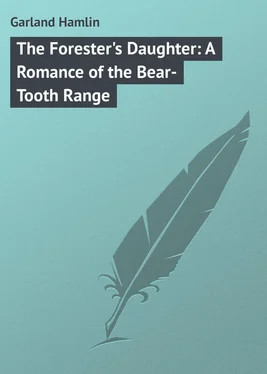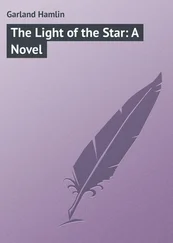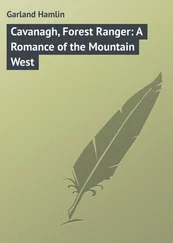Hamlin Garland - The Forester's Daughter - A Romance of the Bear-Tooth Range
Здесь есть возможность читать онлайн «Hamlin Garland - The Forester's Daughter - A Romance of the Bear-Tooth Range» — ознакомительный отрывок электронной книги совершенно бесплатно, а после прочтения отрывка купить полную версию. В некоторых случаях можно слушать аудио, скачать через торрент в формате fb2 и присутствует краткое содержание. Издательство: Иностранный паблик, Жанр: foreign_language, foreign_prose, foreign_adventure, на английском языке. Описание произведения, (предисловие) а так же отзывы посетителей доступны на портале библиотеки ЛибКат.
- Название:The Forester's Daughter: A Romance of the Bear-Tooth Range
- Автор:
- Издательство:Иностранный паблик
- Жанр:
- Год:неизвестен
- ISBN:нет данных
- Рейтинг книги:4 / 5. Голосов: 1
-
Избранное:Добавить в избранное
- Отзывы:
-
Ваша оценка:
- 80
- 1
- 2
- 3
- 4
- 5
The Forester's Daughter: A Romance of the Bear-Tooth Range: краткое содержание, описание и аннотация
Предлагаем к чтению аннотацию, описание, краткое содержание или предисловие (зависит от того, что написал сам автор книги «The Forester's Daughter: A Romance of the Bear-Tooth Range»). Если вы не нашли необходимую информацию о книге — напишите в комментариях, мы постараемся отыскать её.
The Forester's Daughter: A Romance of the Bear-Tooth Range — читать онлайн ознакомительный отрывок
Ниже представлен текст книги, разбитый по страницам. Система сохранения места последней прочитанной страницы, позволяет с удобством читать онлайн бесплатно книгу «The Forester's Daughter: A Romance of the Bear-Tooth Range», без необходимости каждый раз заново искать на чём Вы остановились. Поставьте закладку, и сможете в любой момент перейти на страницу, на которой закончили чтение.
Интервал:
Закладка:
Norcross followed him to the walk, and stood in silence while his guide indicated the pass over the range. It all looked very formidable to the Eastern youth. Thunderous clouds hung low upon the peaks, and the great crags to left and right of the notch were stern and barren. “I think I’ll wait for the stage,” he said, with candid weakness. “I couldn’t make that trip alone.”
“You’ll have to take many such a ride over that range in the night – if you join the service,” Nash warningly replied.
As they were standing there a girl came galloping up to the hitching-post and slid from her horse. It was Berea McFarlane. “Good morning, Emery,” she called to the surveyor. “Good morning,” she nodded at Norcross. “How do you find yourself this morning?”
“Homesick,” he replied, smilingly.
“Why so?”
“I’m disappointed in the town.”
“What’s the matter with the town?”
“It’s so commonplace. I expected it to be – well, different. It’s just like any other plains town.”
Berrie looked round at the forlorn shops, the irregular sidewalks, the grassless yards. “It isn’t very pretty, that’s a fact; but you can always forget it by just looking up at the high country. When you going up to the mill?”
“I don’t know. I haven’t had any word from Meeker, and I can’t reach him by telephone.”
“I know, the line is short-circuited somewhere; but they’ve sent a man out. He may close it any minute.”
“Where’s the Supervisor?” asked Nash.
“He’s gone over to Moore’s cutting. How are you getting on with those plats?”
“Very well. I’ll have ’em all in shape by Saturday.”
“Come in and make yourself at home,” said the girl to Norcross. “You’ll find the papers two or three days old,” she smiled. “We never know about anything here till other people have forgotten it.”
Norcross followed her into the office, curious to know more about her. She was so changed from his previous conception of her that he was puzzled. She had the directness and the brevity of phrase of a business man, as she opened letters and discussed their contents with the men.
“Truly she is different,” thought Norcross, and yet she lost something by reason of the display of her proficiency as a clerk. “I wish she would leave business to some one else,” he inwardly grumbled as he rose to go.
She looked up from her desk. “Come in again later. We may be able to reach the mill.”
He thanked her and went back to his hotel, where he overhauled his outfit and wrote some letters. His disgust of the town was lessened by the presence of that handsome girl, and the hope that he might see her at luncheon made him impatient of the clock.
She did not appear in the dining-room, and when Norcross inquired of Nash whether she took her meals at the hotel or not, the expert replied: “No, she goes home. The ranch is only a few miles down the valley. Occasionally we invite her, but she don’t think much of the cooking.”
One of the young surveyors put in a word: “I shouldn’t think she would. I’d ride ten miles any time to eat one of Mrs. McFarlane’s dinners.”
“Yes,” agreed Nash with a reflective look in his eyes. “She’s a mighty fine girl, and I join the boys in wishing her better luck than marrying Cliff Belden.”
“Is it settled that way?” asked Norcross.
“Yes; the Supervisor warned us all, but even he never has any good words for Belden. He’s a surly cuss, and violently opposed to the service. His brother is one of the proprietors of the Meeker mill, and they have all tried to bulldoze Landon, our ranger over there. By the way, you’ll like Landon. He’s a Harvard man, and a good ranger. His shack is only a half-mile from Meeker’s house. It’s a pretty well-known fact that Alec Belden is part proprietor of a saloon over there that worries the Supervisor worse than anything. Cliff swears he’s not connected with it; but he’s more or less sympathetic with the crowd.”
Norcross, already deeply interested in the present and future of a girl whom he had met for the first time only the day before, was quite ready to give up his trip to Meeker. After the men went back to work he wandered about the town for an hour or two, and then dropped in at the office to inquire if the telephone line had been repaired.
“No, it’s still dead.”
“Did Miss McFarlane return?”
“No. She said she had work to do at home. This is ironing-day, I believe.”
“She plays all the parts, don’t she?”
“She sure does; and she plays one part as well as another. She can rope and tie a steer or bake a cake as well as play the piano.”
“Don’t tell me she plays the piano!”
Nash laughed. “She does; but it’s one of those you operate with your feet.”
“I’m relieved to hear that. She seems almost weirdly gifted as it is.” After a moment he broke in with: “What can a man do in this town?”
“Work, nothing else.”
“What do you do for amusement?”
“Once in a while there is a dance in the hall over the drug-store, and on Sunday you can listen to a wretched sermon in the log church. The rest of the time you work or loaf in the saloons – or read. Old Nature has done her part here. But man – ! Ever been in the Tyrol?”
“Yes.”
“Well, some day the people of the plains will have sense enough to use these mountains, these streams, the way they do over there.”
It required only a few hours for Norcross to size up the valley and its people. Aside from Nash and his associates, and one or two families connected with the mill to the north, the villagers were poor, thriftless, and uninteresting. They were lacking in the picturesque quality of ranchers and miners, and had not yet the grace of town-dwellers. They were, indeed, depressingly nondescript.
Early on the second morning he went to the post-office – which was also the telephone station – to get a letter or message from Meeker. He found neither; but as he was standing in the door undecided about taking the stage, Berea came into town riding a fine bay pony, and leading a blaze-face buckskin behind her.
Her face shone cordially, as she called out: “Well, how do you stack up this morning?”
“Tip-top,” he answered, in an attempt to match her cheery greeting.
“Do you like our town better?”
“Not a bit! But the hills are magnificent.”
“Anybody turned up from the mill?”
“No, I haven’t heard a word from there. The telephone is still out of commission.”
“They can’t locate the break. Uncle Joe sent word by the stage-driver asking us to keep an eye out for you and send you over. I’ve come to take you over myself.”
“That’s mighty good of you; but it’s a good deal to ask.”
“I want to see Uncle Joe on business, anyhow, and you’ll like the ride better than the journey by stage.”
Leaving the horses standing with their bridle-reins hanging on the ground, she led the way to the office.
“When father comes in, tell him where I’ve gone, and send Mr. Norcross’s packs by the first wagon. Is your outfit ready?” she asked.
“Not quite. I can get it ready soon.”
He hurried away in pleasant excitement, and in twenty minutes was at the door ready to ride.
“You’d better take my bay,” said Berea. “Old Paint-face there is a little notional.”
Norcross approached his mount with a caution which indicated that he had at least been instructed in range-horse psychology, and as he gathered his reins together to mount, Berrie remarked:
“I hope you’re saddle-wise.”
“I had a few lessons in a riding-school,” he replied, modestly.
Young Downing approached the girl with a low-voiced protest: “You oughtn’t to ride old Paint. He nearly pitched the Supervisor the other day.”
Читать дальшеИнтервал:
Закладка:
Похожие книги на «The Forester's Daughter: A Romance of the Bear-Tooth Range»
Представляем Вашему вниманию похожие книги на «The Forester's Daughter: A Romance of the Bear-Tooth Range» списком для выбора. Мы отобрали схожую по названию и смыслу литературу в надежде предоставить читателям больше вариантов отыскать новые, интересные, ещё непрочитанные произведения.
Обсуждение, отзывы о книге «The Forester's Daughter: A Romance of the Bear-Tooth Range» и просто собственные мнения читателей. Оставьте ваши комментарии, напишите, что Вы думаете о произведении, его смысле или главных героях. Укажите что конкретно понравилось, а что нет, и почему Вы так считаете.












